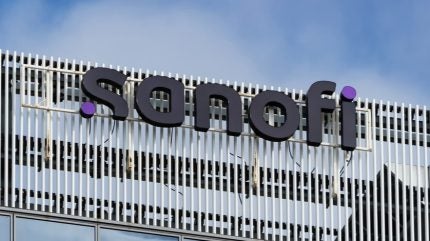
Sanofi is eyeing global regulatory approval for tolebrutinib after releasing positive Phase III data in non-relapsing secondary progressive multiple sclerosis (MS),
The results from the HERCULES Phase III trial (NCT04411641) showed that Bruton tyrosine kinase (BTK) inhibitor delayed the time to six-month disability progression by 31% compared to placebo. Sanofi plans to use the data from the study to support marketing applications to global regulatory authorities before the end of 2024.

Discover B2B Marketing That Performs
Combine business intelligence and editorial excellence to reach engaged professionals across 36 leading media platforms.
The data was presented at the European Committee for Treatment and Research in Multiple Sclerosis (ECTRIMS) 2024 conference taking place from 18-20 September in Copenhagen, Denmark.
Sanofi has had mixed results with tolebrutinib, with the therapy failing to show significant efficacy in patients with relapsing forms of MS. Earlier this month, Sanofi announced that the HERCULES study met its primary endpoint, however, two other Phase III trials in relapsing forms of MS – GEMINI 1 (NCT04410978) and GEMINI 2 (NCT04410991) – were unable to show an improvement over Sanofi’s older therapy Aubagio (teriflunomide).
Sanofi has suffered other bumps in the road, with the US Food and Drug Administration (FDA) having placed a partial clinical hold on Phase III trials evaluating tolebrutinib in MS and myasthenia gravis, including the HERCULES study last year. The clinical hold was placed after reports of liver injury with tolebrutinib were seen. Elevated liver enzymes are a well-documented side effect of BTK inhibitors.
The placebo-controlled Phase III HERCULES trial evaluated 1,127 patients with non-relapsing secondary progressive MS. The patients with confirmed improvement in disability doubled to 10% with tolebrutinib, from 5% in the placebo arm.

US Tariffs are shifting - will you react or anticipate?
Don’t let policy changes catch you off guard. Stay proactive with real-time data and expert analysis.
By GlobalDataLiver enzymes were elevated in 4.1% of participants in the tolebrutinib arm compared with 1.6% with placebo. Sanofi noted that it revised the study’s protocol and was “more stringent” in monitoring liver toxicities. Adding that “all but one case of liver enzyme elevations resolved without further medical intervention” and one patient in the tolebrutinib arm received a liver transplant and died due to post-operative complications.
Results from the GEMINI 1 and 2 trials were also presented at the ECTRIMS conference. While improvements in annualised relapse rates were seen with both tolebrutinib and Aubagio, there were no observed differences between the two in a pooled analysis. Tolebrutinib also delayed the time to six-month disability worsening by 29%.
Sanofi is also evaluating tolebrutinib in patients with primary progressive MS in a Phase III PERSUS trial (NCT04458051). Preliminary results from the study are expected in the second half of next year. Earlier this year, the company suspended tolebrutinib’s development in myasthenia gravis and terminated the Phase III trial (NCT05132569), citing “strategic” considerations.




